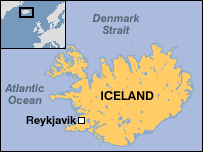Poll: Iceland's left-leaning coalition ahead on eve of elections
 Reykjavik - Iceland's left-leaning coalition has a good chance of being returned to power in parliamentary elections Saturday, according to an opinion poll released on the eve of the vote.
Reykjavik - Iceland's left-leaning coalition has a good chance of being returned to power in parliamentary elections Saturday, according to an opinion poll released on the eve of the vote.
The Social Democratic Alliance headed by Johanna Sigurdardottir is on track to become the largest party with 29 per cent of the vote, giving it 19 seats in the 63-member legislature, the Capacent Gallup poll showed.
Some 227,000 people are eligible to vote in the election.
Sigurdardottir, 66, became Iceland's first woman prime minister and possibly the world's first openly gay head of government when she assumed power in an interim capacity in February.
The Alliance's partner, the Left-Green Movement, was projected to win 27 per cent, effectively doubling its parliamentary representation to 18 seats.
The Independence Party, the main political force in the North Atlantic nation during the past two decades, appeared headed for a meltdown, losing 10 of their current 25 seats.
The party was tipped to win 23.6 per cent of the vote, well below the 36.6 per cent it collected in the last elections in May 2007.
The party and its former leaders have been blamed for allowing the financial sector to expand without checks, resulting in the main banks being taken over by the government in October after suffering dramatic losses because of the global credit crunch.
One of its leaders was veteran politician David Oddsson, who served as prime minister from 1991-2004 and as central bank governor from 2005 until his recent ouster by the interim government.
The Citizens' Movement, formed by people who supported the mass protests that forced the former government under Geir Haarde to resign in January, were tipped to win
4 seats.
Around 1,400 people took part in the April 20-21 survey, which was commissioned by public broadcaster RUV and the Morgunbladid daily.
A new government faces numerous challenges, including rising unemployment and austerity measures put in place after Iceland was forced to negotiate a 2.1-billion-dollar bridging loan from the International Monetary Fund (IMF).
The economy is expected to contract 10 per cent this year, and unemployment has surged to 9 per cent from 1 per cent in recent years.
Interest rates, now on 15.5 per cent, were not expected to come down until next year, according to central bank estimates. (dpa)